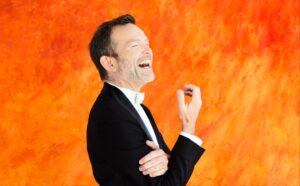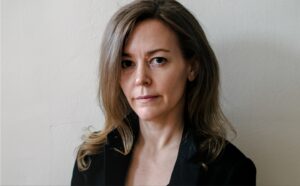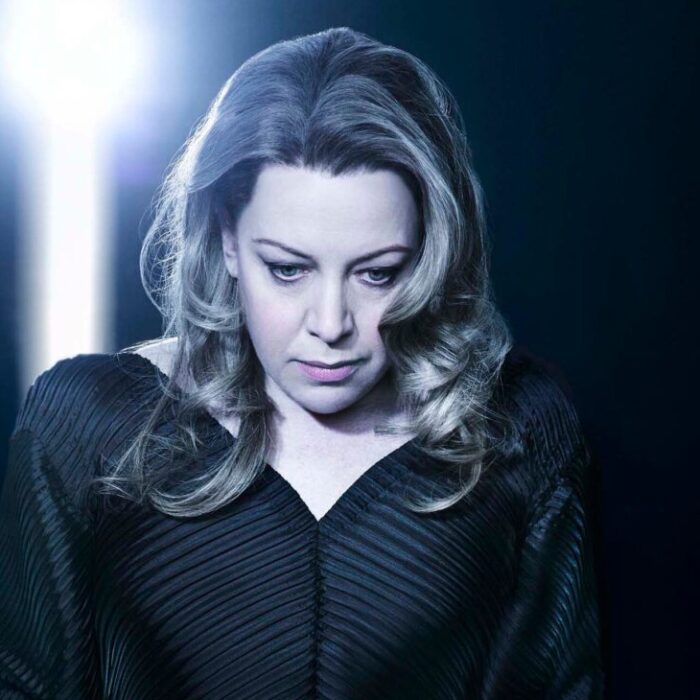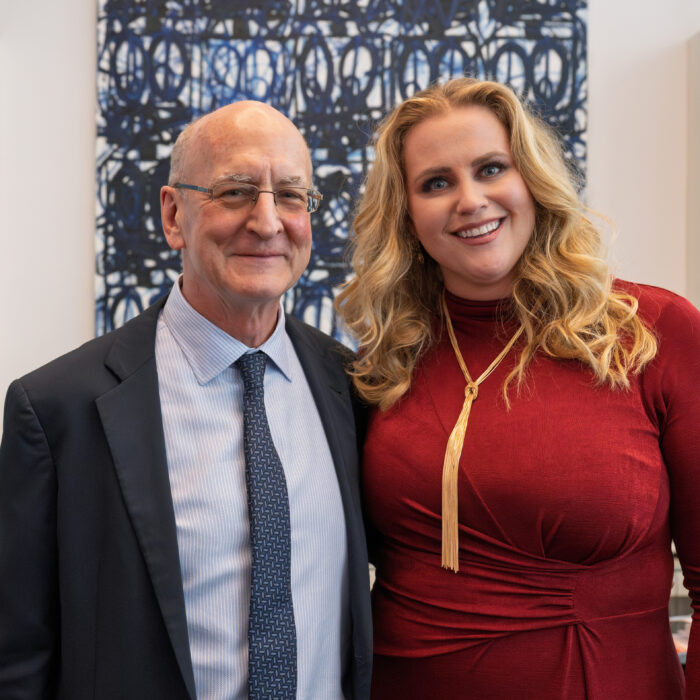
Q & A: Christophe Rousset on Porpora’s ‘Ifigenia in Aulide’ & Les Talens Lyriques Orchestra at Bayreuth Baroque Opera Festival 2024
By Jennifer Pyron(Photo credit: Ignacio Barrios)
Bayreuth Baroque Festival has been awarded “The Best Festival of 2024” by Germany’s Oper! Awards. The first season began in 2020 with a staged production of Nicola Antonio Porpora’s “Carlo il Calvo”, and an opera in concert version of “Gismondo, Re di Polonia” by Leonardo Vinci and libretto by Francesco Briani’s Il Vincitor Generoso. The orchestras in residence have included Armonia Atenea (2020, 2021), {oh!} Orkiestra Historyczna (2022), Concerto Köln (2023), and this year’s Les Talens Lyriques (2024).
OperaWire attended this year’s festival and had the opportunity to visit more with Christophe Rousset, the Musical Director and harpsichordist of Les Talens Lyriques, about Bayreuth Baroque’s new production of Porpora’s “Ifigenia in Aulide” and what makes this year most exciting.
As stated in their bio, the ensemble Les Talens Lyriques takes its name from the subtitle of Jean-Philippe Rameau’s opera Les Fêtes d’Hébé (1739) was formed in 1991 by the harpsichordist and conductor Christophe Rousset. Championing a broad vocal and instrumental repertoire, ranging from early Baroque to the beginnings of Romanticism, the musicians of Les Talens Lyriques aim to throw light on the great masterpieces of musical history, while providing perspective by presenting rarer or little known works that are important as missing links in the European musical heritage. This musicological and editorial work, which contributes to its renown, is a priority for the ensemble.
Christophe Rousset has been nominated for eight awards in the Opera and Gramophone Awards this 2024-25 season. His musical engagements at both local and international levels feature rare works evolving and baroque as something to be rediscovered and expanded upon today.
OperaWire: What are you most excited about being here at Bayreuth Baroque Opera Festival?
Christophe Rousset: I have a long story with Max Emanuel Cencic. He says that I introduced him to opera on stage with “L’incoronazione di Poppea” a long time ago in Toulouse and I’ve always had a nice relationship with him and I was very touched when he asked me to do this production. But not only the production of the opera but also all the concerts, including the one with Sandrine Piau and my recital with Anna Prohaska. So it’s a real honor for us. I didn’t know about Bayreuth at all unless I’ve touched Wagner, just very recently, but I never was a devotee to Wagner so I never made the trip to Bayreuth and it’s not that easy to reach, really, as you’ve probably noticed. So that was the opportunity to finally see this historical theater which is absolutely perfect. It’s such a beautiful place. There is kind of a link with this theater through “Farinelli” the film. We’ve (Les Talens Lyriques) done the soundtrack, but the images are from this theater. Unfortunately, I was not asked to conduct in the film, but I did conduct the soundtrack. But, you’ll see how incredible this theater is. It’s a real jewel. It sounds like the historical theaters I know, that’s to say it’s a little dry, but very clear and very inspiring.
Max created the staging of it and he knows this stage quite well because it’s the fifth year of this festival and he knows that if you put the singer too far away upstage, it doesn’t sound at all. So, mostly the arias are front, downstage, and it helps with the balance with the orchestra. The pit of course is at a fixed level, so you can’t really adapt. You have to adapt with the dynamics of the orchestra.
OW: How would you musically describe Porpora’s “Ifigenia in Aulide”?
CR: It’s a real rediscovery. It has never been performed in modern times. So, it’s quite an interesting piece based on “Iphigenia in Aulis”. We know this from the Greek tragedy. But the music is sometimes very dramatic and sometimes just bel canto. So you have to accept that opera seria is the place for nice coloraturas and beautiful tunes. This opera was written for London when Porpora was in competition with Händel, at exactly the same year as “Alcina”. People were raving for Porpora, actually, more than for Händel. This is the moment where Porpora took all the star singers of the troupe of Händel. And when Porpora arrived in London they all moved to Porpora’s because Porpora was the singing teacher of all those stars. So it was like a devotion to the master, going back to him.
“Ifigenia” is quite demanding for singers. It’s difficult to cast. And you can recognize what is for Farinelli with wonderful spinato, with wonderful pieces. So, you have beautiful recits and incredible virtuosi for Diana and she has the biggest part of the arias in the opera. So, you have a trio, you have a duet for bass and a soprano which is quite unusual. You have accompanied recits, as I said, and some incredible numbers. For instance, there is a pastoral in the beginning of the third act sung by Achilles with flutes and oboes. It’s an atmosphere that’s really unique. It’s Porpora genius. So, we don’t know much about operas by Porpora, do we? I don’t know how much you know about Porpora. If you’ve seen the film, “Farinelli”, there’s a wonderful aria “Alto Giove, è Tua Grazia” which is now a hit for all the countertenors. But here you have new hits for the singers.
The drama is really going towards this terrible end which involves sacrifice, when Diana appears as the ex-machina and she solves the whole thing. But, the tension is quite interesting because the paths of the priests are very important in that piece. It is quite demanding vocally, but also the place in the libretto, that really says that religion should be “the law”, and Achilles is against him and says that reason should be the law. So, it’s a real fit between them and the priest also says we can manipulate the people so easily, with religion. So it’s quite terrible, and this is really what the libretto is about. This fight between religion and reason. Which is quite actual, actually. But, also something important in the 18th century.
OW: How do you feel that the music accompanies the hall itself? What aesthetically are you discovering while having the music of this opera in the Margravial Opera House Bayreuth? What feels new to you?
CR: What’s new is actually the music because it’s a rediscovery and I’m surprised by every note, even the recitative secco. It’s unusual for us, not exactly what we are used to. But also, of course, performing in that special place really drives you in a special direction. I must say that the staging is quite nice because it doesn’t really give you an idea of time, but it is tribal and gives something very strong. It goes very well with the music and beautiful costumes, and some nudities. Also, the whole thing is done very well.
OW: What is your story behind creating your ensemble Les Talens Lyriques in 1991?
CR: We have more than 30 years of existence now, so it’s quite something. We’ve been quite honored this year, especially in Germany. I had a Händel prize in Gotenna. I was the privileged artist in Gertsberg, the Mozart Festspiele. And now here in Bayreuth, it’s quite an achievement. I am very proud of all those honors in Germany. I keep trying my best to find the finest and most honest way of interpreting this music. It’s nice because with age my ideas are very clear. So, we had more than seven days of orchestra for this opera and in two days we were ready. So, the rest was for the staging. The members of my ensemble are used to my way of working and they know exactly where I want them to go. So, it’s very efficient. And this is a big satisfaction.
OW: What educational projects for school children does Les Talens Lyriques offer? How do you feel music education of young persons affects the future of local communities?
CR: We offer many things, actually. We’ve started the youth educational project because we were looking for places to rehearse in Paris. This is really a difficult matter in Paris, to find places where my group could rehearse. So, I thought maybe let’s go to schools and have the spaces there and make this music exist for those young people. And then the project developed, so they are now participating a lot through education so they can play as an orchestra with tablets. So, one has the violin part, one has the viola part, and they play together along with a conductor giving the top to start. There is also education for composition and improvisation on harpsichord. There are some orchestra classes, too, where we teach them to play and experience the instruments. This is very important so they understand how much you have to be concentrated and devoted to an instrument to be able to produce. They can come to rehearsals, maybe in theaters as well. Some of the young people actually followed us in Vienna, last season. They had contact with the local students. When we performed “The Magic Flute” once, they organized a show with all the figures of the opera with classes in theater as well. They’ve interviewed us and once there was a broadcast on France Musique radio. So, it’s quite rewarding for them. They’ve also filmed us, so there are many possibilities and many collaborations with different classes. Literature of course, and Italian or German classes, history. There is quite a lot of interest in our actions and it’s very touching. Sometimes they come very close to us, so we rehearse and you might have a student right next to the flute or the harpsichord, next to the cellos. And then they have a different way of receiving music, of course. All of these moments are very touching, I must say. And I think they have an impact on those young people as well, so that’s quite nice.
OW: What can you tell us about your experience with music as a child? When did you know that this was for you?
CR: I didn’t start that young. I was ten when I started. But, it was for me more a matter of aesthetics. I’m interested in archaeology. That was my first passion when I was very young. Then I went towards baroque aesthetics. So, it was about painting, theater, architecture and the music came quite late. But it was very clear that the harpsichord was the instrument for me because it was a kind of time machine. I could really dive into this world.
OW: What projects do you have planned for the remainder of this year?
CR: I’ve been asked to conduct the Monteverdi Choir Orchestra. I was so impressed with this invitation. It was quite unexpected and I’m very enthusiastic about it because I’ve been a big admirer for this group for many years. It has influenced my way of being with this music. So, it’s quite something for me. Plus there are two Bach cantatas and one piece by Charpentier. I am very happy about this! It’s a big tour with seven concerts, including Germany, England, Italy. I have a lot of things to do in the future with Händel, a lot of Händel. And a US tour, along the west coast and then in Canada. It’s also quite varied, sometimes oratorio, chamber music, opera on stage, so it’s a wide panel of activities. Two operas by Händel, “Orlando” and “Giulio Cesare”. It’s one of my first loves in baroque music. I remember when I was a child growing up in Aix-en-Provence and I had the chance to attend the rehearsals and I remember the first Händel piece I heard there and it was a big shock. So I always keep Händel next to my heart. When we travel to the US as an ensemble we also try to give the “French touch” of music. French music is a big part of our activity. This is why when we go to the states we try to put a big part of French repertoire, including Rameau, Lully, and Montéclair. Those composers in the medium sized orchestra with a mezzo. And, we try to make American audiences travel to Versailles with us through the time machine of baroque music.



